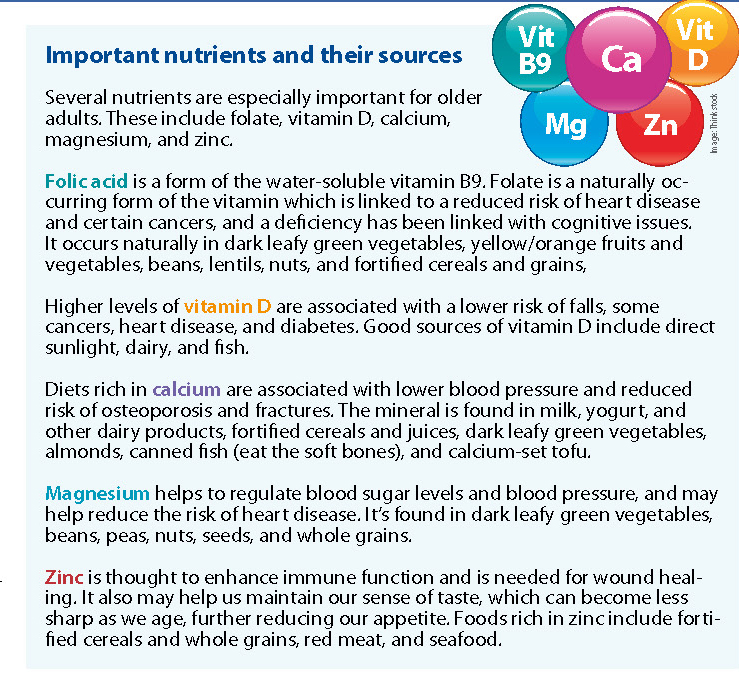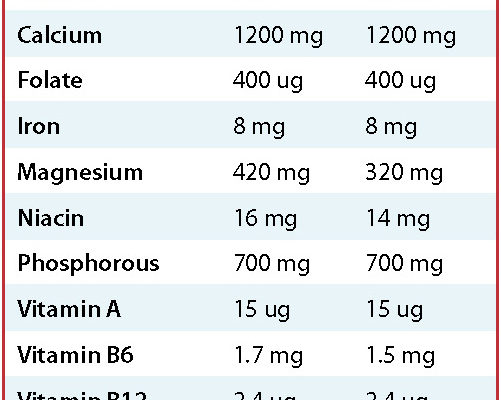How to Make Sure You’re Getting the Right Amount of Nutrients
 Research finds that half of seniors aren’t getting the recommended nutrients. Revamping your diet and taking supplements can put you back on track. According to the Centers for Disease Control and Prevention, most older adults are able to consume all of the nutrients they need via a healthy and varied diet, and obtaining vitamins and minerals from food often is key to their health benefits. However, as we age, the amount of food we eat declines, with older adults consuming about 1,200 calories a day compared to the 2,000 recommended to help us meet the minimum daily allowances for vitamins and minerals.
Research finds that half of seniors aren’t getting the recommended nutrients. Revamping your diet and taking supplements can put you back on track. According to the Centers for Disease Control and Prevention, most older adults are able to consume all of the nutrients they need via a healthy and varied diet, and obtaining vitamins and minerals from food often is key to their health benefits. However, as we age, the amount of food we eat declines, with older adults consuming about 1,200 calories a day compared to the 2,000 recommended to help us meet the minimum daily allowances for vitamins and minerals.
A decrease in food intake can be due to a number of reasons. Ill-fitting dentures and oral health problems can make it difficult to chew nutrient-rich foods, while physical disabilities may prevent people from getting to the store to buy healthy food. Older adults who live alone may think it’s too much effort to prepare a balanced meal, and cognitive decline can lead them to forget to eat. They also may have health issues that cause impaired absorption and impaired metabolism. Some medications (including corticosteroids, anticonvulsants, thyroid hormone, antibiotics, and diuretics) also can affect the appetite and/or interfere with the absorption of nutrients. These factors may put frail older adults at particular risk of a deficiency.
“Nutrients that older adults often lack include calcium, vitamin D, vitamin B12, and potassium,” says Susan Bowerman, MS, RD, a registered dietitian at UCLA Health System. The ideal ap-proach to nutrition should include a balanced and healthy diet, regular assessments from your doctor, and vitamin and mineral supplementation when needed to meet the Recommended Dietary Allowance (RDA). The RDA is the amount of certain vitamins and minerals the government recommends in order to meet the nutrient requirements of most healthy people. It is only a guideline, however, and it may not address the needs of people with certain medical problems, or those who are taking some types of medications.
Are you getting enough? “There really is no way to know if you’re getting the right amount of RDAs, unless you keep track,” says Bowerman. “RDA levels should be achievable on a well-balanced diet. But keep in mind that for some nutrients there are no RDAs, but adequate intakes (AIs), such as for potassium.”
According to Bowerman, in general, a multiple vitamin without iron would be appropriate for most seniors; and particularly for senior women, one with extra calcium. “There’s no reason not to take these as ‘nutrition insurance,’” she adds.
How your health affects nutrition. Certain medical conditions may require that you take less of certain nu-trients. For example, people with liver dysfunction should let their doctor know if they are taking extra vitamin A, because their bodies may have more difficulty removing it, and they can develop toxic levels.
Vitamin B12 deficiency is common in older adults. Vegetarians, and those who consume large quantities of alcohol, have a history of gastric bypass surgery or gastrectomy (surgical removal of the stomach), or who have a condition called atrophic gastritis also are at increased risk for this deficiency. Because vitamin B12 deficiency can contribute to poor balance and memory impairment, check with your doctor to ensure that your B12 level is adequate, and eat foods that contain this nutrient, such as low-fat dairy products and lean meats.
If you’re not getting enough of your RDAs from your diet alone, you may need a supplement. Although vitamin and mineral supplements may seem harmless, you do need to exercise caution when taking them. Some vitamins and minerals may interact with both prescription and over-the-counter medications. To prevent unwanted side effects, tell your doctor about any vitamin and mineral supplements you are taking.

The post How to Make Sure You’re Getting the Right Amount of Nutrients appeared first on University Health News.
Read Original Article: How to Make Sure You’re Getting the Right Amount of Nutrients »
Powered by WPeMatico


